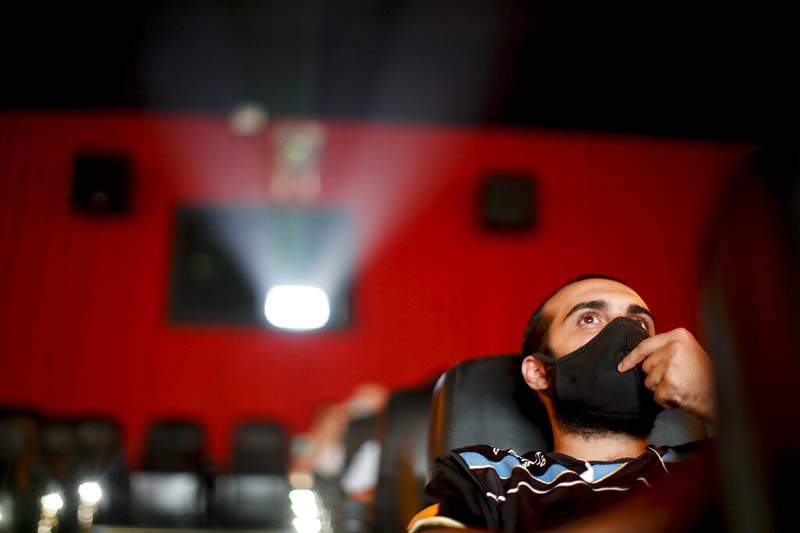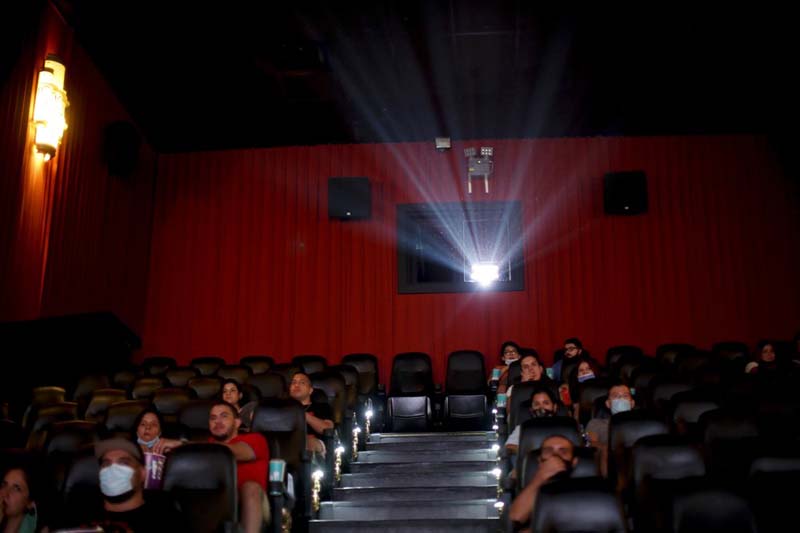

Sao Paulo and Buenos Aires were a tale of two cities this week, with Brazil’s megalopolis partially shutting down and bracing for possibly the worst of the COVID-19 pandemic, while residents of Argentina’s capital were stepping out to movie theaters and restaurants.
The two biggest cities in the South American neighbors are headed in opposite directions, a trend that experts say demonstrates how places that loosen restrictions against the advice of scientists see a spike in the pandemic while those that keep social distancing measures in place can reopen their economies sooner.
Sao Paulo, home to almost 12 million people, is facing the worst two weeks yet in the pandemic and the growing risk that its once-resilient health care system will collapse, Gov. João Doria told reporters Wednesday. More than 75% of the city’s intensive-care beds are occupied by COVID-19 patients and some wards — like those of the private Albert Einstein hospital — are full for the first time.
Doria said the entire state, where 46 million people reside, on Saturday will face the highest level of restrictions to limit the virus’ spread. That means closure of all bars, restaurants, shopping malls and any other establishment deemed nonessential until at least March 19.
Meanwhile, the nearly 3 million residents of Buenos Aires are enjoying an easing of restrictions, with authorization to attend movie theaters taking effect this week. On Wednesday, official figures showed just 26% of intensive-care beds were occupied by COVID-19 patients. The low hospitalization rate also enabled local authorities in mid-February to reopen bars and restaurants until 2 a.m. — something long sought in a city famous for its all-hours culture.
That means Buenos Aires’ famed steakhouses are reigniting their fires, while counterparts in Sao Paulo extinguish theirs.
Buenos Aires’ casinos also reopened at the end of 2020, and authorities are discussing whether the soccer-crazy city will be able to return to the stadiums soon. In Brazil, despite President Jair Bolsonaro’s push to allow fans back, no local authorities are seriously considering opening stadiums. The 48,000-seat NeoQuimica arena on the east side of Sao Paulo is being used as a vaccination post.
Some good news from the Sao Paulo region came on Tuesday, when soccer great Pelé received his first dose of a COVID-19 vaccine. The 80-year-old posted the news on his social media channels.
“The pandemic is not over yet. We must keep discipline to preserve lives until many people have taken the vaccine,” the three-time World Cup winner said. “When you go out, please don’t forget your mask and maintain social distance.”
His plea is important as Bolsonaro continues to cast doubt on the effectiveness of masks.
The distance between the two nations has seemingly widened during the pandemic, with Bolsonaro and Argentina’s Alberto Fernández adopting opposite tacks in their handling of the crisis. The former downplayed the disease’s risks and has insisted on keeping the economy churning, while the latter has taken a more cautious approach.
Fernández imposed one of the longest quarantines in the world between March and October, despite risks of damaging an economy already in a recession.
Over the past week, Brazil has recorded 35 COVID-19 deaths per million residents, almost triple that of Argentina.
Troubles in Sao Paulo worsened after furtive Carnival celebrations in mid-February. Though street celebrations and parades were canceled, many paulistas, as residents are known, traveled or joined unmasked gatherings. The city declined to allow days off work, traditionally permitted during the Carnival period, in a bid to keep people from partying.
Izidoro Silveira, 34, got a job waiting tables at a pizzeria in downtown Sao Paulo two months ago after almost a full year unemployed. He’s upset about his restaurant’s imminent shutdown.
“Those doing deliveries won’t be hurt, but I and many others will,” a distressed Silveira said as he watched a televised news broadcast about the shutdown. “I don’t know what to tell my wife and my daughter. I’m afraid I’ll lose my job again, even though I work at a place that takes all precautions.”
Not far away, movie theaters on the city’s main drag, Paulista Avenue, are empty, just as they have been since the pandemic began.
Argentina’s ease doesn’t mean the virus is completely under control. Wednesday’s official figures showed 262 deaths and more than 8,700 new infections in the country. Vaccine rollout is slow. But the overwhelming gloom seen in Sao Paulo seems to be far from Buenos Aires.
With a bag of popcorn in one hand and a soft drink in the other, 8-year-old Bautista Sundblat was eager to enter a movie theater in Buenos Aires’ tony Palermo neighborhood to watch “Bad Boys Forever”.
“He’s very excited,” said his mother, Martina. “We’d been waiting for a long time. He’s a movie fanatic. There’s still a long way to go, but little by little we’re getting where we wanted.”
___ Rey reported from Buenos Aires.

Sao Paulo and Buenos Aires were a tale of two cities this week, with Brazil’s megalopolis partially shutting down and bracing for possibly the worst of the COVID-19 pandemic, while residents of Argentina’s capital were stepping out to movie theatres and restaurants.
The two biggest cities in the South American neighbours are headed in opposite directions, a trend that experts say demonstrates how places that loosen restrictions against the advice of scientists see a spike in the pandemic while those that keep social distancing measures in place can reopen their economies sooner.
Sao Paulo, home to almost 12 million people, is facing the worst two weeks yet in the pandemic and the growing risk that its once-resilient health care system will collapse, Gov João Doria told reporters Wednesday. More than 75% of the city’s intensive-care beds are occupied by COVID-19 patients and some wards — like those of the private Albert Einstein hospital — are full for the first time.
Doria said the entire state, where 46 million people reside, on Saturday will face the highest level of restrictions to limit the virus’ spread. That means closure of all bars, restaurants, shopping malls and any other establishment deemed non-essential until at least March 19.
Meanwhile, the nearly 3 million residents of Buenos Aires are enjoying an easing of their restrictions, with authorisation to attend movie theatres taking effect this week. On Wednesday, official figures showed just 26% of intensive-care beds were occupied by COVID-19 patients. The low hospitalisation rate also enabled local authorities in mid-February to reopen bars and restaurants until 2 am – something long sought in a city famous for its all-hours culture.
That means Buenos Aires’ famed steakhouses are reigniting their fires, while counterparts in Sao Paulo extinguish theirs.
Buenos Aires’ casinos also reopened at the end of 2020, and authorities are discussing whether the soccer-crazy city will be able to return to the stadiums soon. In Brazil, despite President Jair Bolsonaro’s push to allow fans back, no local authorities are seriously considering opening stadiums. The 48,000-seater NeoQuimica arena on the east side of Sao Paulo is being used as a vaccination post.
Some good news from the Sao Paulo region came on Tuesday, when soccer great Pelé received his first dose of a COVID-19 vaccine. The 80-year-old posted the news on his social media channels.
“The pandemic is not over yet. We must keep discipline to preserve lives until many people have taken the vaccine,” the three-time World Cup winner said. “When you go out please don’t forget your mask and maintain social distance.”
His plea is important as Bolsonaro continues to cast doubt on the effectiveness of masks.
The distance between the two nations has seemingly widened during the pandemic, with Bolsonaro and Argentina’s Alberto Fernández adopting opposite tacks in their handling of the crisis. The former downplayed the disease’s risks and has insisted on keeping the economy churning, while the latter has taken a more cautious approach.
Fernández imposed one of the longest quarantines in the world between March and October, despite risks of damaging an economy already in a recession.
Over the past week, Brazil has recorded 35 COVID-19 deaths per million residents, almost triple that of Argentina.
Troubles in Sao Paulo worsened after furtive Carnival celebrations in mid-February. Though street celebrations and parades were canceled, many paulistas, as residents are known, traveled or joined unmasked gatherings. The city declined to allow days off work traditionally allowed during the Carnival period, in a bid to keep people from partying.
Izidoro Silveira, 34, got a job waiting tables at a pizzeria in downtown Sao Paulo two months ago, after almost a full year unemployed. He’s upset about his restaurant’s imminent shutdown.
“Those doing deliveries won’t be hurt, but I and many others will,” a distressed Silveira said as he watched a televised news broadcast about the shutdown. “I don’t know what to tell my wife and my daughter. I’m afraid I’ll lose my job again, even though I work at a place that takes all precautions.”
Not far away, movie theatres on the city’s main drag, Paulista Avenue, are empty, just as they have been since the pandemic first began.
Argentina’s ease doesn’t mean the virus is completely under control. Wednesday’s official figures showed 262 deaths and more than 8,700 new infections in the country. Vaccine rollout is slow. But the overwhelming gloom seen in Sao Paulo seems to be far from Buenos Aires.
With a bag of popcorn in one hand and a soft drink in the other, 8-year-old Bautista Sundblat was eager to enter a movie theatre in Buenos Aires’ tony Palermo neighbourhood to watch ‘Bad Boys Forever’.
“He’s very excited,” said his mother, Martina. “We’d been waiting for a long time. He’s a movie fanatic. There’s still a long way to go, but little by little we’re getting where we wanted.”